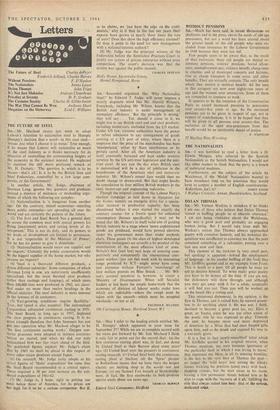1111h m t e Letters
The Future of Steel Charles dePcyer Frederick Jellinek, Charles Hervey Without Pensions F. O'Hanlon The Nationalists James Loose Dylan Thomas John Tripp It's Not Just Makarios Andreas Cleanthous Priestley at Seventy D. F. Graham The Costume Society Charles H. Gibbs-Smith The War That Cannot Be Won Anthony Short Megatons on the Motorway Enid C. Williams THE FUTURE OF STEEL
SIR,-1-Mr. Macleod strove last week to adapt Labour's intention to nationalise steel to Humpty Dumpty's decision that a word—in this case steel- ' 'means just what I choose it to mean.' True enough, if he means that Labour will nationalise so much of the steel industry as it thinks necessary for its objective of controlling the commanding heights of the economy in the national interest. He neglected to mention the still more profound remark of Mr. H. Dumpty: 'The question is, which is to be• master--that's all.' Is it to be the British Iron and Steel Federation, controlled by a few large com- panies, or the Government?
In another article, Mr. Judge, chairman of Dorman Long, ignores this question and produces instead a mixture of mistaken or misleading argu- ments of which the following are samples: (I) Nationalisation is 'a hangover from another age.' On the contrary, mixed economies—entailing more public enterprise—are spreading all over the world and are certainly the pattern of the future.
(2) The Iron and Steel Board 'has a general duty to secure the common weal with special powers for fixing [maximum] prices and setting levels of de- velopment.' This is not its duty, and its powers to set levels of development are limited to persuasion. It is not 'responsible to the Minister of Power,' for he has no power to give it directions.
(3) 'Nationalisation would mean one supplier and no imports? Certainly the public corporation would be the biggest supplier of the home market, but why assume no imports?
(4) 'Steel is a thousand different products, a dozen different industries.' Some companies, of which Dorman Long is one, arc notoriously insufficiently specialised, but the main finished steel, products (other than castings and forgings), of which more lhan•100,000 tons were produced in 1962, are classi- fied under no more than twelve headings in the official statistics. The steel industry is most unusual in the fewness of its customers.
(5) 'Fast-growing conditions require flexibility.' True, but 'speed is also essential. The nationalised Corporation advocated continuous casting in 1951. The Steel Board, as long ago as 1957, deplored the slow progress in continuous casting. It is no great triumph therefore that John Summers has just Put into operation what Mr. Macleod alleges to be `the first continuous casting works.' Oxygen con- verter processes were adopted in thirteen countries before we started, and when we did, our only nationalised firm was two years ahead of the field. No published figures support Mr. Judge's claim that by 1965 we shall be ahead in this respect of .every other major producer except Japan.
(6) On research, Mr. Judge airily adopts as his actual figures of 'likely' expenditure the sums that the Steel Board recommended in a critical report. These required a 50 per cent increase on the esti- mated expenditure of 1961-62.
(7) Mr. Judge is, I hope, right in putting our costs below those of America., for its prices are too high for it to be a serious competitor. But if, as he claims, we 'just have the edge on the conti- nentals,' why is it that in the last ten years their exports have grown at nearly three times the rate of ours? Does this show the high efficiency claimed? Or does it point to the need for new management with a national-interest outlook?
(8) Mr. Judge was the principal witness of the Federation before the Restrictive Practices Court to justify our system of private enterprise without price competition. The court's decision was that the system was against the public interest.
Holly House, Leverstoke Green.
Hemel Hempstead, Herts CHARLES DEPEYLR














































 Previous page
Previous page